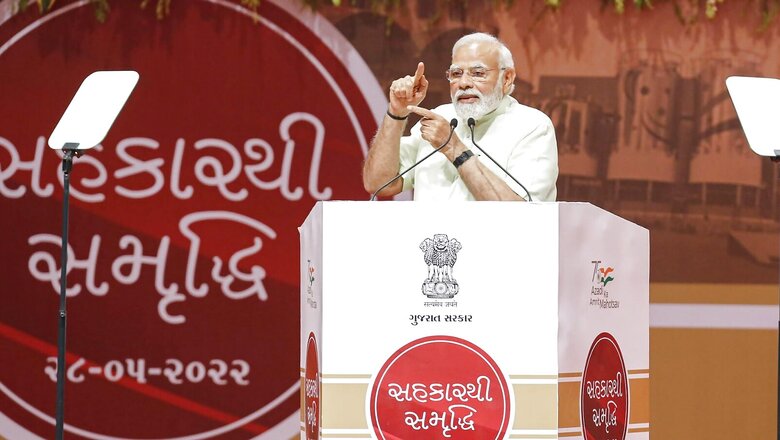
views
Parliament is the temple of democracy and parliamentary procedures the rites by which the will of the people is translated into practice. But the terms and jargon involved in Lok Sabha and Rajya Sabha processes can be difficult to grasp. The News18 series, House Talk, brings you a ready reckoner to make sure that none of it is Greek to you.
The Multi State Cooperative Societies (Amendment) Bill, 2022 is among the new bills listed for the monsoon session of Parliament.
At the ‘Sahkar Se Samruddhi’ conclave of cooperative entities at Gujarat in May, Union Home Minister Amit Shah had spoken about amending the Multi State Cooperative Societies Act.
“Work is on to prepare a national database of cooperative entities, as there is no such database at present in the country. We are also in talks with state governments to change the audit system for cooperative societies. All these changes will bring in more transparency in purchase and recruitment processes and eventually make cooperatives more trustworthy among the masses,” he had said.
News18 explains all you need to know about the bill, its goal and why it matters:
- THE AIM: There are about 8,55,000 cooperatives, of which 1,77,000 are credit societies, 700,000 are cooperative societies, 17 national-level cooperative unions and 33 state cooperative banks. There are more than 63,000 active Primary Agricultural Credit Society (PACS) with more than 12 crore members. Around 91% of the villages have cooperatives.The amendment aims at rationalisation of government role and increasing member participation in the working of multi-state cooperative societies to increase public faith and create a conducive environment for their growth and development. It looks at building self-reliance and democratic cooperative institutions and enabling cooperative societies to compete in a new economic environment.Its goal is to help them raise resources more effectively, by promoting functional autonomy and professionalisation. One of the important objectives is to protect the interests of depositors or members against vested interests and mismanagement.
- MULTI-STATE COOPERATIVE BODIES: While cooperatives are a state subject, in many cases, societies such as those for sugar, milk or banks operate across more than one state. A case in point could be sugar mills along the districts on the Karnataka-Maharashtra border that obtain cane from both the states. The law applies to such bodies.
- THE EXISTING ACT: The Multi State Cooperative Societies (Amendment) Bill, 2010 was introduced in the Lok Sabha on November 15, 2010 by then Minister of Agriculture, Consumer Affairs, Food and Public Distribution Sharad Pawar. It allowed the Central Government to appoint a Central Registrar of Cooperative Societies. A multi-state cooperative society can be registered if its main object is to serve the interest of members in multiple states. Its bylaws provide for social and economic betterment of its members in accordance with the cooperative principles. The Bill allowed the Central Registrar to declare any multi-state cooperative society as sick. Under the Act, the Central Government can appoint an interim board for a maximum of five years, on the recommendation of the Registrar. The Central Registrar could also declare a cooperative to be viable within the five years and reinstate the board of directors.
- THE PROBLEMS: Giving all control to the Central Registrar added to red tape, forcing societies to seek nod from both the Centre and State. Another issue is lack of transparency as the board of directors has control of finances and administration. Also, the Central Registrar can inspect societies only in special conditions. This has even led to Ponzi schemes in some cases.
- THE CHANGES EXPECTED: According to an Indian Express Report, the Centre held extensive consultations with experts from various fields such as bankers, sugar commissioners, cooperative commissioners, housing societies federations, etc. Senior Central Government officials said they will also increase their manpower, first in Delhi and then in the states, to ensure better governance of the societies. Also, technology will be used to bring in transparency.
- MOVING TOWARDS IT: The Narendra Modi government has ambitious plans for PACS, ranging from computerisation, modernisation, generating employment, and taking the number up from 63,000 currently functional to 3,00,000.On June 29, the Cabinet Committee on Economic Affairs chaired by Prime Minister Narendra Modi approved the computerisation of PACS. Union Minister for Information and Broadcasting Anurag Thakur said the move will benefit 13 crore farmers, mainly small and marginal ones.The government has also proposed that PACS and the District Central Cooperative Banks (DCCBs), as well as the State Cooperative Banks (SCBs), will be on a common platform and have a common accounting system, as currently each of them has a different software.A top source in the government said, “Around Rs 3.19 lakh crore will be spent by the GoI, state governments and NABARD, of which the GoI will bear 75%.”The plan is to have three lakh functional and viable PACS in three lakh villages across India. The scope of PACS is set to be broadened with more than 20 new options, including that of functioning as Farmer Producer Organizations (FPOs).The Ministry of Cooperation has already slashed the surcharge and minimum alternate tax ( MAT).On June 1, the Union Cabinet decided to allow cooperatives to register as “buyers” on the government’s e-marketing platforms, enabling cooperatives to procure goods and services from about 40 lakh vendors across the country who are registered on the GeM portal. On June 8, the RBI raised the limit for individual housing loans for cooperatives banks.
- WHY COOPERATIVES MATTER: The Gujarat cooperative movement is strong in the domain of agricultural products such as cotton, groundnuts, coriander leaves, garlic, dairy, milk products, handicrafts and the sugar sector. The Congress retained its influence in the cooperative movement of Gujarat for long, but now the Bharatiya Janata Party (BJP) is they key player there. The various agricultural products marketing cooperative committees (APMC) and cooperative banks produce employment too. The cooperatives in Gujarat, Maharashtra, Rajasthan, Madhya Pradesh and other states also emerged as job providing agencies, which absorbed cadres, supporters and sympathisers of the political parties influential in its structure .Many important leaders of political parties in these states emerged from the cooperative movement. In fact, they run parallel power structures at various levels in these states. Cooperative federations contain a large number of active members who are crucial not merely as voters, but as opinion, vote and cadre mobilisers.
Read all the Latest News, Breaking News, watch Top Videos and Live TV here.


















Comments
0 comment